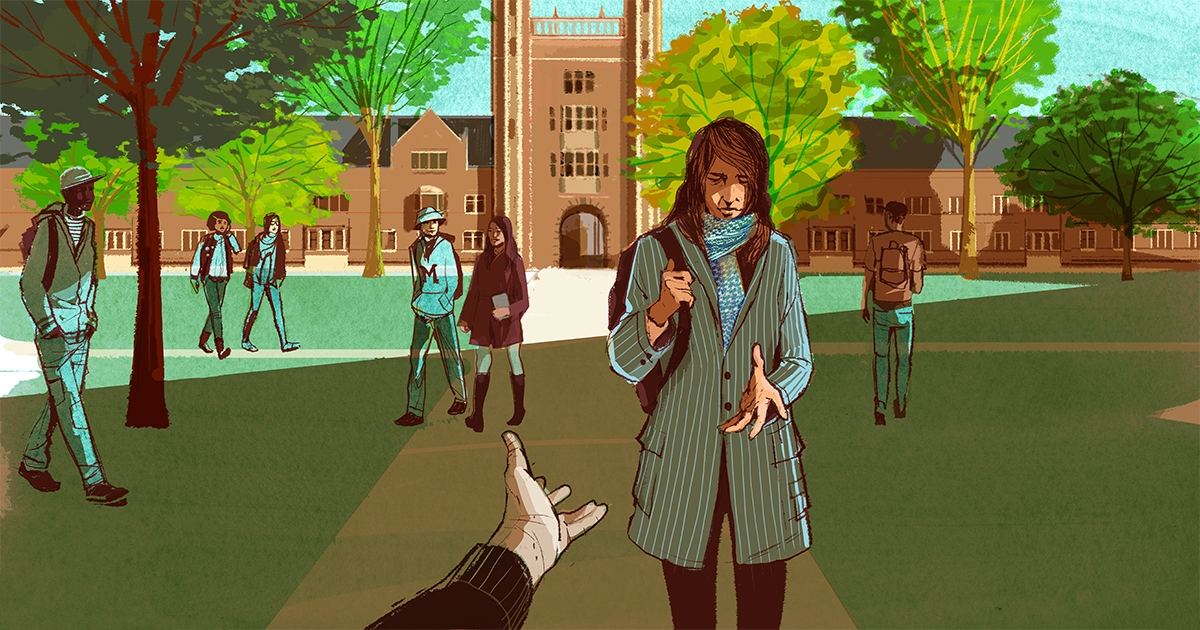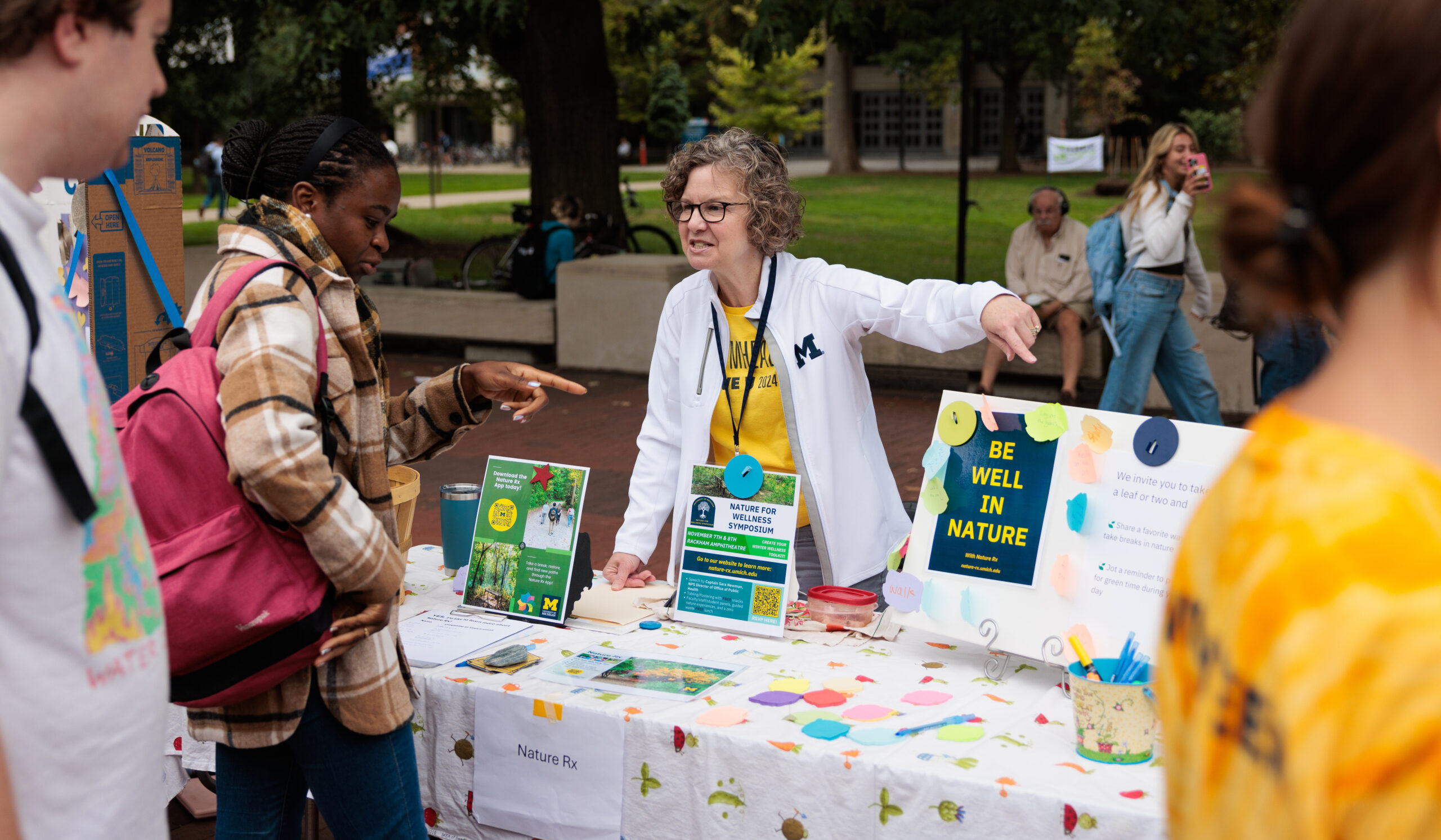U-M’s Peer Advisors for Veteran Education Program matches student veterans to create a support network that is always just a phone call away.
In the fall of 2017, a few weeks after Rebecca Mitchell arrived at U-M as a transfer student from Grand Rapids Community College, she started suffering from panic attacks and was on the brink of withdrawing. Her first grades were lackluster and made her wonder if the University had made a mistake admitting her.
Mitchell’s angst was not your typical new student freakout. At 23, she had already served five years in the Army National Guard as a logistics specialist, including a particularly stressful deployment in the Middle East, where she was required to be on constant alert. What’s more, living on a college campus with young, sometimes inadvertently insensitive, classmates who romanticize or politicize the military had left her feeling frustrated and drained.
“They ask me, ‘What’s the worst thing you’ve seen in combat?’ There are a lot of vets who deal with things that weigh on their conscience,” she says. “They don’t know. They will never know unless they join.”
Mitchell did not give up on U-M. Instead, she sent an alarmed text message to Alberto Acosta, her contact through the Peer Advisors for Veteran Education (PAVE) program, asking to meet for a coffee. Acosta—who arrived at U-M in 2016 after six years in the Army, including a deployment in South Korea—talked her into staying.
Launched in 2012, the PAVE program was initially piloted at UM-Flint, Eastern Michigan University, and Lansing Community College. Seven years later, it operates on 37 college campuses nationwide and touches just over 5,000 students a year, all under the management and oversight of U-M’s Military Support Programs and Networks (MSPAN), based in Ann Arbor. MSPAN, in turn, is the result of an initial donation to U-M’s Depression Center and the department of psychiatry by philanthropist and New York Mets owner Fred Wilpon, ’58.
PAVE’s founding was both strategic and critical. The need to provide specialized support services for student veterans facing the challenges of assimilating simultaneously into civilian and college life was an issue not faced in higher education since the Vietnam War. Then came Sept. 11, 2001.
According to Veterans Administration data, the wars in Afghanistan and Iraq have produced more than 7.2 million military veterans. That exceeds the 6.6 million living veterans of the Vietnam War. In 2008, as the conflicts dragged on, Congress passed the Post-9/11 G.I. Bill to provide the most generous funding since the end of World War II for service members to pursue higher education.
About 30 new undergraduate student veterans matriculate each semester at U-M. Most are older than their undergraduate classmates. Many are married with children and juggling jobs as well as service-related disabilities. “This is a highly motivated, highly disciplined group. But that doesn’t mean they don’t have specific needs and challenges that require support,” says Timothy Nellett, ’14, PAVE’s national program coordinator and a Marine who served in Iraq and Afghanistan before returning to U-M to pursue his education.
According to Nellett, student veterans need help understanding such mundane matters as how to access their G.I. Bill benefits or seek academic tutoring. The latter being one of the biggest challenges, given that service members are trained to be staunchly self-reliant. Seeking help from anyone other than similarly ranked military brethren is not their custom.
“Student veterans view hierarchy as power. It’s easy for them to view the professors as, say, the colonel, and when we talk about going to office hours to speak to the professor, it reminds them of the military,” says Phil Larson, U-M’s program director for veteran and military services. “Unless you know you’re getting an award, there’s nothing good about walking into the colonel’s office,” says Larson, who is an Air Force veteran with more than 20 years of student affairs experience.
First, however, the PAVE staff must engage veterans. To that end, U-M’s three student peer advisers divvy up the incoming student veterans each semester and contact them before school has even begun. They explain the benefits of the program and let them know they will be checking in with them monthly.
Many student-veterans are at first baffled by PAVE, not seeing the need for such a program. Mitchell was one of them. She remembers her initial thought was, “Well that’s kind of weird. At community college, I didn’t have a peer adviser.”
Larson says about three-quarters of the student veterans at U-M meet or communicate with their advisers during the first semester, after what he calls the “honeymoon period” of the first two months. He equates the seriousness of the calls they start receiving afterward to a near-drowning. “Somewhere around the third month, the water is coming up to their ears and they say, ‘OK, I think I need a little help! I may need a little lifeline here.’ And that’s what we do.”
At U-M, all peer advisors are student veterans who have already been in the program for at least one semester. Acosta remembers his peer adviser helping him through those first perplexing and alienating months on campus. “I’m a talker, I like to talk a lot, it eases me, it makes me calm. So if I ever wanted to talk to my adviser, we’d get a coffee and it would make me feel better,” he recalls. “I try to do the same thing with my advisees. I say ‘Look, I am here if you need to talk or you need something.’”
Almost immediately after school began, Mitchell reached out to Acosta with a medical emergency. He put her in touch with the Veterans Administration representative for health care. “I went from having a support system in the military to Ann Arbor, where I didn’t have anything. I learned that day that I had somebody who understood me that I could trust.”
That trust resulted in her texting him when her panic attacks felt unmanageable. “I would have dropped out if not for Alberto,” she says of the anxiety she felt. “I was literally like, ‘This is too much for me.’”
Some student veterans’ problems are, of course, too serious or complex to solve over text messages or a cup of coffee with a PAVE adviser. Post-traumatic stress disorder (PTSD) arising from military service is a major challenge for many veterans, with an average of 20 veterans from all military eras committing suicide every day, according to data from the U.S. Department of Veterans Affairs. PAVE advisers are taught to steer veterans with signs of PTSD to other professional resources right away.
“There’s been a couple of incidents of veterans who committed suicide who were either directly involved or had been involved at some point with the PAVE program over the years, but it’s been fortunately very, very rare,” Nellett says, adding that he hopes PAVE is the reason. “I would really like to hope the connections they’re establishing within the program are helping these students combat mental health struggles.”
Larson also credits the students. “Peers providing the word-of-mouth service of saying ‘I got the help I needed from PAVE’ goes a long way to promoting the program.”
Another sign of success is a low dropout rate nationally for student veterans. According to the 2017 National Veteran Education Success Tracker, of the more than 853,000 students who took advantage of the Post-9/11 G.I. Bill benefits during its first 3 1/2 years, about 54 percent completed their degrees within six years. That’s slightly above the national average of 52.9 percent for all students.
Mitchell is now one of U-M’s three student PAVE advisers. She has not only learned to handle her own anxiety, but also the 18- and 19-year-olds who incredulously ask, “You’re a veteran?” when they learn her background. She now responds with her own question, “What do you think a veteran is supposed to look like?”
Steve Friess is a Michigan-based freelance journalist who has written about military affairs for The New Republic, Playboy, The New York Times, and Al Jazeera America, among others.





